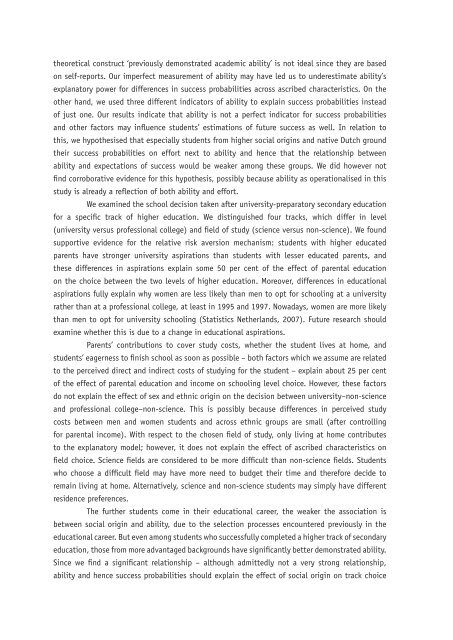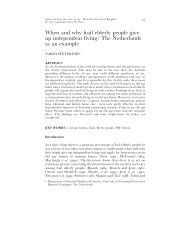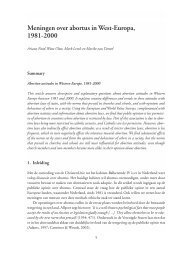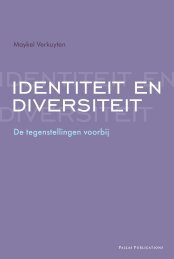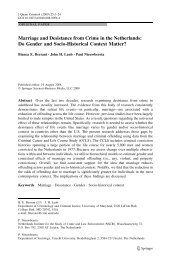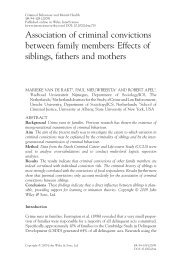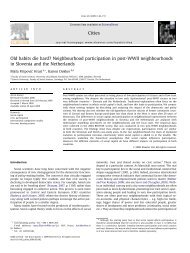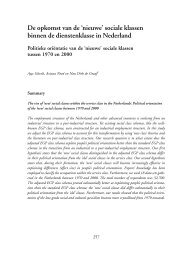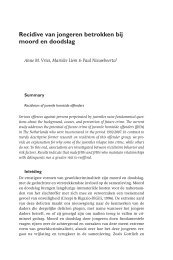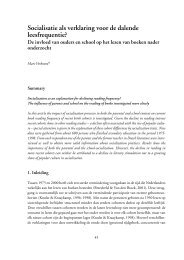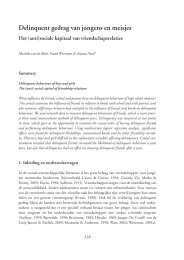Ethnic Hostility among Ethnic Majority and Minority Groups
Ethnic Hostility among Ethnic Majority and Minority Groups
Ethnic Hostility among Ethnic Majority and Minority Groups
You also want an ePaper? Increase the reach of your titles
YUMPU automatically turns print PDFs into web optimized ePapers that Google loves.
theoretical construct ‘previously demonstrated academic ability’ is not ideal since they are based<br />
on self-reports. Our imperfect measurement of ability may have led us to underestimate ability’s<br />
explanatory power for differences in success probabilities across ascribed characteristics. On the<br />
other h<strong>and</strong>, we used three different indicators of ability to explain success probabilities instead<br />
of just one. Our results indicate that ability is not a perfect indicator for success probabilities<br />
<strong>and</strong> other factors may infl uence students’ estimations of future success as well. In relation to<br />
this, we hypothesised that especially students from higher social origins <strong>and</strong> native Dutch ground<br />
their success probabilities on effort next to ability <strong>and</strong> hence that the relationship between<br />
ability <strong>and</strong> expectations of success would be weaker <strong>among</strong> these groups. We did however not<br />
fi nd corroborative evidence for this hypothesis, possibly because ability as operationalised in this<br />
study is already a refl ection of both ability <strong>and</strong> effort.<br />
We examined the school decision taken after university-preparatory secondary education<br />
for a specifi c track of higher education. We distinguished four tracks, which differ in level<br />
(university versus professional college) <strong>and</strong> fi eld of study (science versus non-science). We found<br />
supportive evidence for the relative risk aversion mechanism: students with higher educated<br />
parents have stronger university aspirations than students with lesser educated parents, <strong>and</strong><br />
these differences in aspirations explain some 50 per cent of the effect of parental education<br />
on the choice between the two levels of higher education. Moreover, differences in educational<br />
aspirations fully explain why women are less likely than men to opt for schooling at a university<br />
rather than at a professional college, at least in 1995 <strong>and</strong> 1997. Nowadays, women are more likely<br />
than men to opt for university schooling (Statistics Netherl<strong>and</strong>s, 2007). Future research should<br />
examine whether this is due to a change in educational aspirations.<br />
Parents’ contributions to cover study costs, whether the student lives at home, <strong>and</strong><br />
students’ eagerness to fi nish school as soon as possible – both factors which we assume are related<br />
to the perceived direct <strong>and</strong> indirect costs of studying for the student – explain about 25 per cent<br />
of the effect of parental education <strong>and</strong> income on schooling level choice. However, these factors<br />
do not explain the effect of sex <strong>and</strong> ethnic origin on the decision between university–non-science<br />
<strong>and</strong> professional college–non-science. This is possibly because differences in perceived study<br />
costs between men <strong>and</strong> women students <strong>and</strong> across ethnic groups are small (after controlling<br />
for parental income). With respect to the chosen fi eld of study, only living at home contributes<br />
to the explanatory model; however, it does not explain the effect of ascribed characteristics on<br />
fi eld choice. Science fi elds are considered to be more diffi cult than non-science fi elds. Students<br />
who choose a diffi cult fi eld may have more need to budget their time <strong>and</strong> therefore decide to<br />
remain living at home. Alternatively, science <strong>and</strong> non-science students may simply have different<br />
residence preferences.<br />
The further students come in their educational career, the weaker the association is<br />
between social origin <strong>and</strong> ability, due to the selection processes encountered previously in the<br />
educational career. But even <strong>among</strong> students who successfully completed a higher track of secondary<br />
education, those from more advantaged backgrounds have signifi cantly better demonstrated ability.<br />
Since we fi nd a signifi cant relationship – although admittedly not a very strong relationship,<br />
ability <strong>and</strong> hence success probabilities should explain the effect of social origin on track choice


